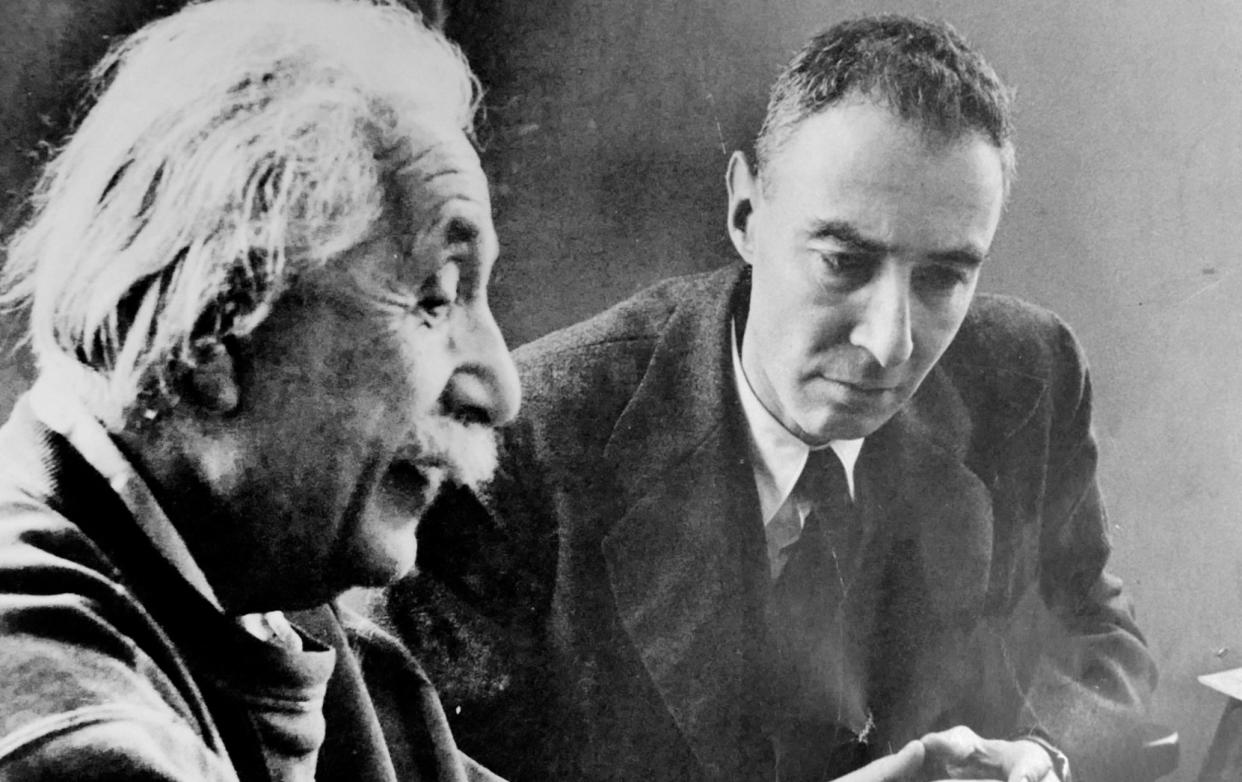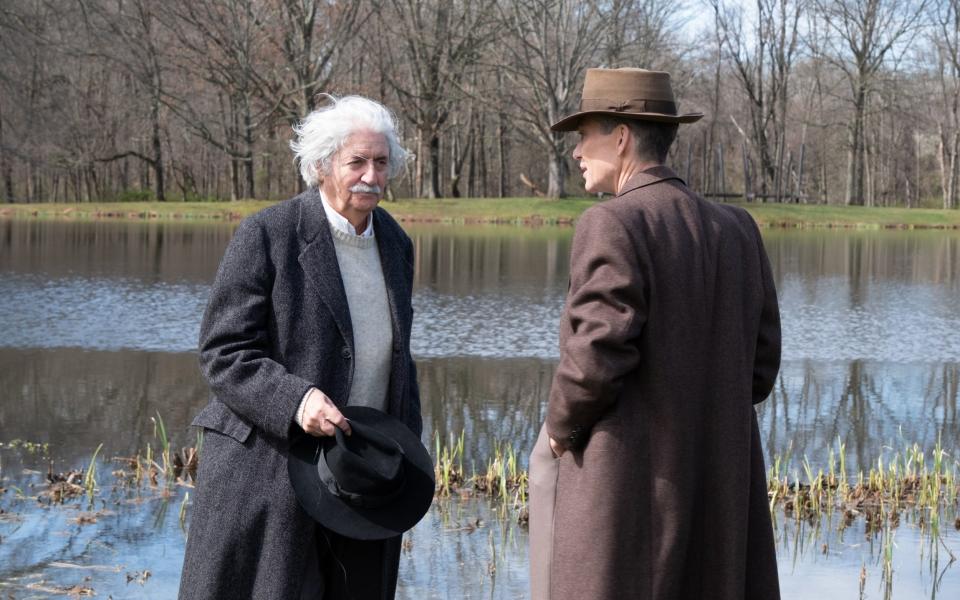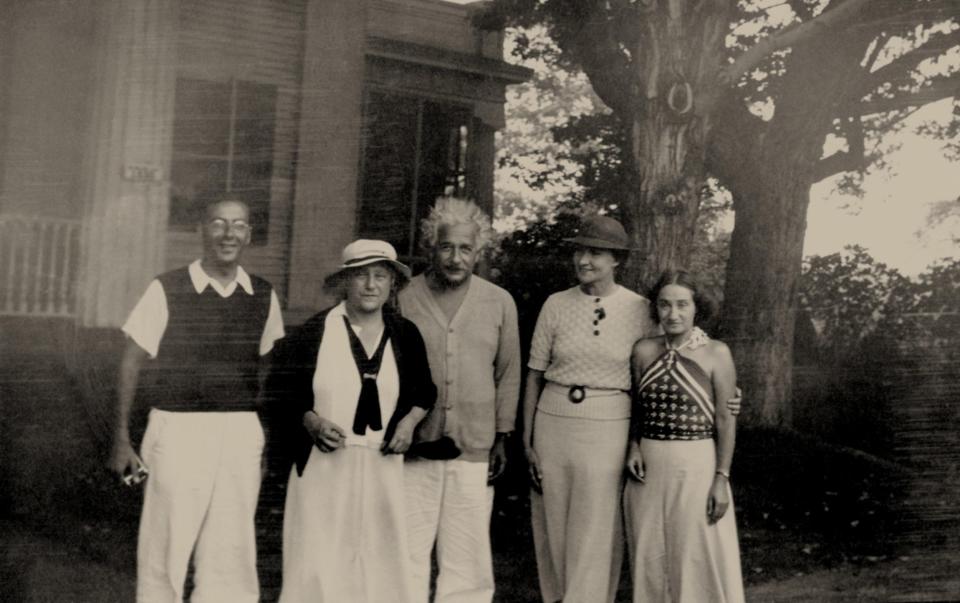How the unlikely bond between Einstein and Oppenheimer shaped history

Of all the star names in Christopher Nolan’s Oppenheimer – Cillian Murphy, Emily Blunt, Matt Damon, Florence Pugh, Robert Downey Jr et al – it is perhaps Tom Conti who is the most intriguing: not so much for the actor himself as the character he plays. For Conti’s role is that of Albert Einstein, the 20th century’s most iconic and influential scientist, and the part is pivotal to the movie.
Typically for Nolan, the film plays out simultaneously in multiple timelines: one before J Robert Oppenheimer’s Trinity atomic bomb test in April 1945, and one after it. Einstein features in the latter, talking to Cillian Murphy’s Oppenheimer by a pond in Princeton. We don’t initially hear what they’re saying, but the import of the conversation is clear both from the body language and the fact that they’re being watched at a distance by Lewis Strauss, Downey’s hawkish proponent of second-generation H-bombs.
As the movie unfolds and the scene is referenced several times, it becomes clear that Einstein’s role is significant for two reasons. First, he represents old physics to Oppenheimer’s new: Einstein’s thinking (such as his famous equation E = mc2) was what had in general terms made the bomb possible, but he’s now been supplanted by a man who has both the will and the skill to take science to the next level. Second, Einstein is effectively Oppenheimer’s moral conscience, showing him the full horror of the atomic age now unleashed and impressing on him the irreversibility of his creation.
As a dramatic device, it works brilliantly: it’s Yoda and Luke Skywalker, it’s Dumbledore and Harry Potter, it’s Uncle Ben and Peter Parker. With great power comes great responsibility, and all that. But is it true? The answer, as is so often the case in movies based on real characters and events, is partly.
Einstein and Oppenheimer first met in the early 1930s at the California Institute of Technology (Caltech), where Oppenheimer was teaching and Einstein serving several stints as a visiting professor. It was while returning to Europe from his third Caltech sojourn in March 1933 that Einstein decided to renounce his German citizenship, seeing that Adolf Hitler’s government – then barely a couple of months old – was already a de facto anti-Semitic dictatorship: but when he came back to America later that year it was to the Institute for Advanced Study in Princeton, New Jersey, on the other side of the country from Oppenheimer.

Nor were the men close during the Second World War, when Oppenheimer headed up the Manhattan Project to build the atom bomb. True, Einstein had written to President Franklin D Roosevelt in 1939 warning of Nazi Germany’s potential to develop “a single [atomic] bomb, carried by boat and exploded in a port, which might very well destroy the whole port together with some of the surrounding territory,” but the Manhattan Project did not start for another three years, and Einstein was denied security clearance for the programme on the grounds of his leftist political beliefs.
It was not until after the war, therefore, that professional acquaintanceship morphed into personal friendship. In 1947, Oppenheimer joined Einstein at the Institute for Advanced Study, which by then had become host to various academic versions of all-star rock supergroups. There is a photograph of them taken that year by Alfred Eisenstaedt which appears revealing about the nature of their relationship. The two men are sitting at a desk. Einstein is on the left, instantly identifiable by his bushy moustache and shock of hair. Dressed in a casual sweatshirt, he is scribbling equations on a pad. On the right, Oppenheimer – suit, tie, side parting – leans forward as he watches. The teacher-student hierarchy is clear – Einstein was 25 years the senior – but there is also something penetrating in Oppenheimer’s gaze which suggests very little gets past him.

By that stage, both men had come to disavow their roles in the development of nuclear weapons. In a meeting with President Truman after the end of the war, Oppenheimer said that he had “blood on my hands”, a remark which so infuriated Truman that he later snapped, “I don’t want to see that son-of-a-bitch in this office ever again.” For his part, Einstein told a magazine interviewer that “had I known that the Germans would not succeed in developing an atomic bomb, I would have refrained from taking any action whatsoever.” His fear of a weapon which could destroy a single port had in only a few years become outdated to an absurdly quaint degree: Hiroshima and Nagasaki demonstrated that entire cities could be vaporised, and by the early 1950s thermonuclear bombs could theoretically have destroyed the entire planet.
Einstein and Oppenheimer may have been friends and fellow travellers, but their personalities were also sharply divergent. Oppenheimer wasn’t afraid to rub people up the wrong way when he needed to (and often when he didn’t), and he had his fair share of psychological troubles and self-destructive tendencies as a younger man, but he was also an inspirational and dynamic leader.
In contrast, he saw Einstein as “the friendliest of men. Just being with him was wonderful … [He]
is also, and I think rightly, known as a man of very great good will and humanity.
Oppenheimer also talked of Einstein’s distaste for authority and his pacifism. “His was a voice raised with very great weight against violence and cruelty wherever he saw them. In his last years, as I knew him, Einstein was a 20th-century Ecclesiastes, saying with unrelenting and indomitable cheerfulness, ‘Vanity of vanities, all is vanity.’ He was almost wholly without sophistication, and wholly without worldliness.”
But Einstein was not so naïve as Oppenheimer made out, and the misjudgment cost the younger man dear. In 1954, Oppenheimer was summoned to a meeting with Strauss on trumped-up charges relating back to tenuous communist connections from the 1930s. It was the height of McCarthyism, and Einstein urged Oppenheimer not to afford the process any legitimacy. He spent an hour trying to persuade him to jump before he was pushed, to resign from the Atomic Energy Commission on his own terms and not suffer the public humiliation which Strauss clearly had in mind for him.
But Oppenheimer felt that this would be unpatriotic, so he faced his tribunal, was branded a traitor on evidence that amounted to little more than hearsay, and was stripped of both his security clearance and any political influence he may still have possessed. “The trouble with Oppenheimer,” Einstein said later, “is that he loves [something that] doesn’t love him – the United States government.” Einstein was a nomad who had in the course of his life had six separate citizenships, as well as a period of being stateless. Oppenheimer was only ever a proud American.
The episode so burned Oppenheimer that he didn’t even sign the Russell-Einstein Manifesto the following year, in which Einstein and Bertrand Russell asked for peaceful resolution to international conflicts and the involvement of politically neutral scientists in assessing the dangers of weapons of mass destruction. But he agreed with its aims, and for both him and Einstein – his friend, his colleague, his inspiration – one particular phrase from that manifesto ultimately held true: “Remember your humanity, and forget the rest.”
Oppenheimer is in cinemas now. Read our review here


